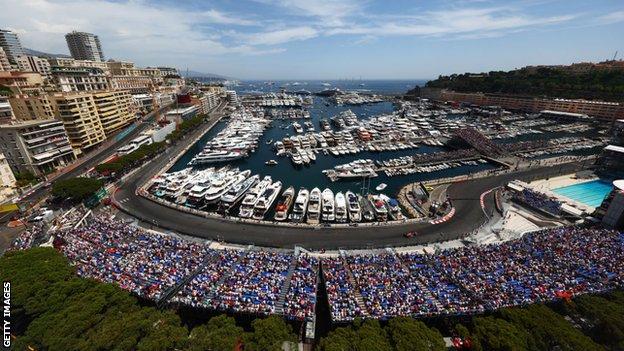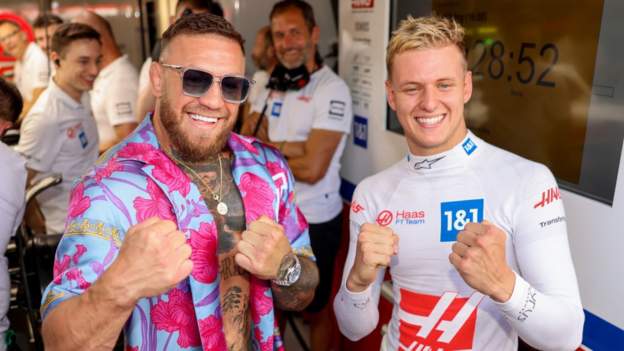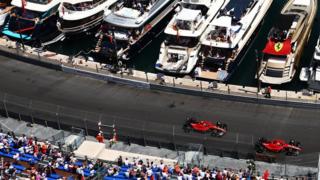
Charles Leclerc was denied the chance to finish what looked like becoming one of the great Monaco laps by the red flag at the end of qualifying on Saturday.
Already 0.225 seconds clear of the field, the Ferrari driver was up on his own time by more than 0.4secs as he approached the Tabac corner and the final part of the lap, which had been his best sector all weekend, when the red flag was thrown for an accident at Portier, behind him on the other side of the tunnel.
“I definitely wanted to finish that lap,” Leclerc said. “It was a really, really good lap. Also, the onboard [footage] is pretty oversteer-y, so it’s a nice onboard. It was a great lap until then, but it happens in Monaco, so no frustration.”
The Ferrari driver got to celebrate a second consecutive home pole position anyway, as his first lap in the final session had been good enough to put him on top.
But as Leclerc celebrated, and turned his focus on turning his pole into a much-needed win on Sunday, a question hung in the air – will he and Formula 1 get a chance to savour Monaco again next year?
The idea that there might not be a Monaco Grand Prix in 2023 has been scoffed at by some commentators. But the prospect is very real.
Surely they won’t get rid of Monaco?
For a long time, Monaco has been considered irreplaceable, secured by its status as a symbol of everything that is appealing and interesting about F1.
The glamour, the money, the danger and even the slight hint of naughtiness; the apotheosis of Somerset Maugham’s image of “a sunny place for shady people”, a description that could apply in some ways to F1 as much as to Monaco.
But even though Leclerc said on Thursday that dropping the race “would be a bad move for both parties”, F1 is seriously considering the idea.
The sport’s owners, the US group Liberty Media, won’t comment publicly, but senior sources say that while they recognise the race’s appeal, its fame for an audience well beyond F1’s usual, they are growing tired of a number of aspects of the race.
Monaco has always been an anachronism. For a long time, the tight and twisty course that winds it way up and down the hills of this tiny Principality has seemed ill-suited for F1 cars in all their modern speed, size and complexity.
Watching a grand prix car around here remains one of global sport’s most thrilling spectacles, but doing so only underlines how mad it is.
But that’s not the core of the problem.
As ever, money is involved, but not in as direct a way as one might imagine.
Monaco has always paid a fee to hold the race. At the moment, this stands in the region of 10-12m euros, one of the lowest on the calendar. But this is not the issue either.
F1 wants changes, in a number of areas.
First, there’s the television coverage. Monaco is alone on the calendar in the fact that its local television company directs the pictures the world sees; everywhere else it is F1’s own TV station.
Most in F1 have felt for some time that this has led to a quality gap, that Monaco’s television coverage is weaker than elsewhere. Incidents are missed, unusual choices are made, and F1 is no longer prepared to accept this.
Then there’s the race’s unique advertising agreement. Elsewhere, tracks have to use F1’s in-house advertising, which promotes the sport’s own corporate sponsors.
In Monaco, these are supplemented by deals made locally, and from F1’s point of view it leads to some glaring exceptions. Chief among them this year is that a luxury watch brand has significant signage around the track – but it’s not the one that pays millions to F1 to be the sport’s official one.
Then there’s the track itself. The lack of overtaking in Monaco has long been accepted as part of the event, something that cannot be avoided because of the location of the race.
But F1 feels that small changes could make a difference – a corner widened here, for example, a kerb moved there, a rethinking of the harbour-front chicane, perhaps – but that the Automobile Club de Monaco is reluctant to entertain the idea.
And that bleeds into the final issue – what is perceived by many inside the sport as the way the frustrating place is run, on a number of different levels, questionable choices on a number of aspects of the weekend, and an unwillingness to accept outside ideas.
Many will feel that such matters seem trivial in comparison with what they perceive to be the positives of Monaco’s presence on the calendar.
But Liberty is emboldened by F1’s rapidly growing popularity around the world, by the interest of other countries in hosting races, by the success of the new landmark event in Miami, and the achievement of landing a race next year on the famous Strip in Las Vegas.
Monaco is not the only historic race under threat. France is said to be a goner. Of more concern to many will be that there is a very real chance Spa-Francorchamps in Belgium could also be dropped next year, although it may be saved if Covid continues to cause problems in China, and the hopes of a race at Kyalami in South Africa fade.
Could there really be no Monaco Grand Prix next year? The realities of Monaco’s positions and the threat it faces could be heard loud and clear in a comment made by Mercedes F1 team principal Toto Wolff after qualifying.
“I’m biased,” he said. “I live here, I love it, and what Monaco has to offer is spectacular.
“F1 is important for Monaco and Monaco is important for F1, but it needs a positive approach from both parties.
“Monaco has to embrace the new realities of what the sport stands for today, and the impact it has on the world. And at the same time, Monaco will always be respected within F1 as something which is special.
“No one should take things for granted. If we didn’t race in Monaco, it would be a shame from my perspective as a team owner.”
What about the race?
With Leclerc on pole, ahead of team-mate Carlos Sainz, and Red Bull’s Sergio Perez third ahead of Leclerc’s title rival Max Verstappen, the race looks Ferrari’s to lose.
Track position is king in Monaco, and if they can hold their positions at the start, Ferrari should be able to control the race from the front.
But it is far from a foregone conclusion. For one thing, storms are expected overnight, and the official weather forecast is for a 60% chance of rain in the race.
For another, the removal this year of the arcane rule that obliges teams to start a race on the tyre they used in second qualifying frees up strategy, especially here.
Championship leader Max Verstappen has looked out of sorts so far this weekend, but there was a hint of his real pace just before the Perez-induced red flag at the end of qualifying, when he set his fastest first sector time of the weekend – second only to Leclerc’s only to be thwarted as well.
But there is a reason Verstappen has won four races from only one pole this year until Monaco, and Leclerc has only two victories from four poles. The Red Bull is much stronger in the race.
Monaco is very gentle on tyres. Could Verstappen choose a harder tyre at the start, run really deep into the race, and try to overhaul the Ferrari that way?
Verstappen has turned a 46-point deficit to Leclerc into a six-point advantage in the championship in just three races. Leclerc badly needs to stem that tide with a win.
But, for Leclerc, that long-awaited home victory is a long way from won.



